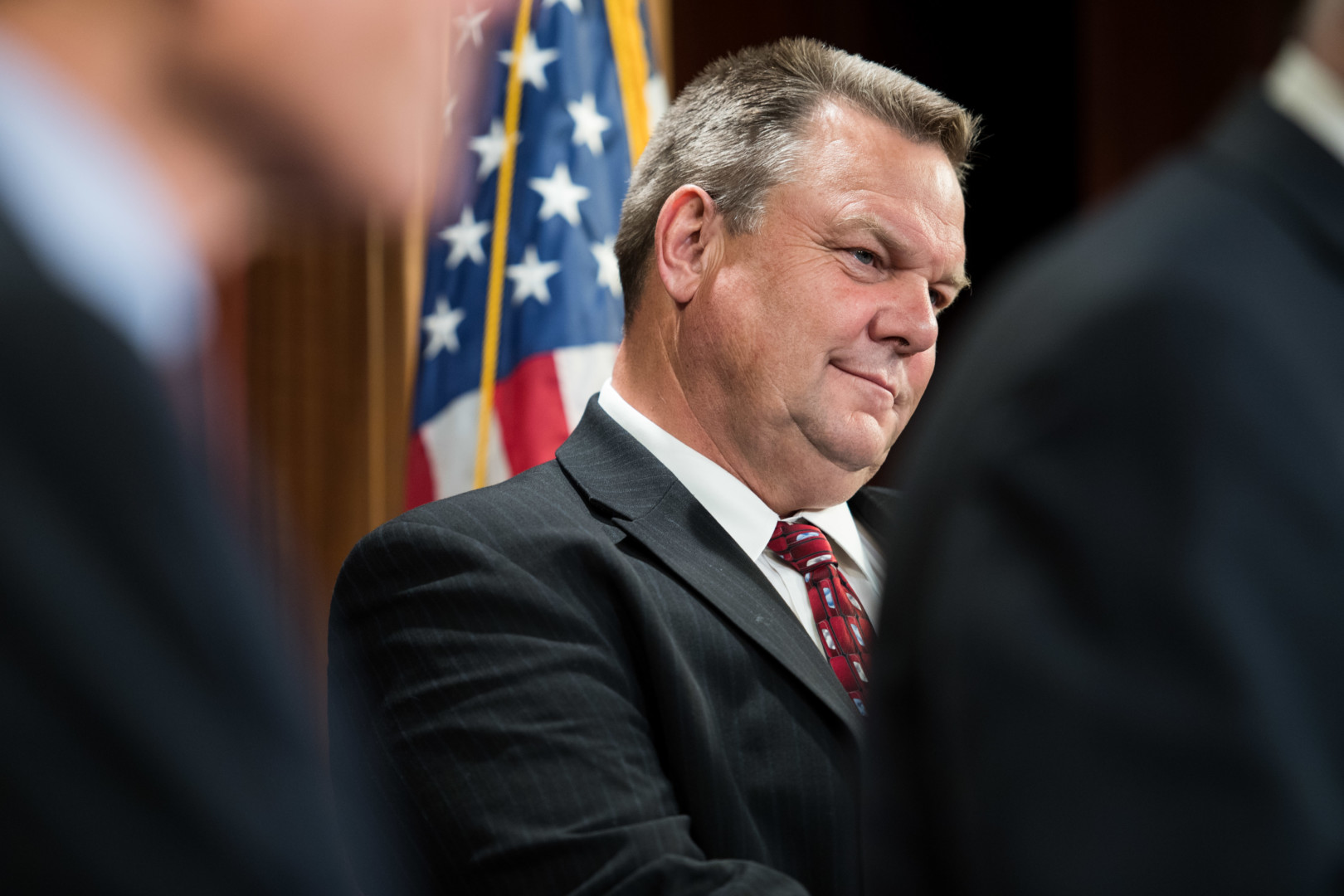Sen. Jon Tester (D-Mont.) has seen his disapproval rating rise more than other senators who are considered vulnerable when they face voters for re-election next year.
A red-state moderate and farmer who spent the 2016 election cycle leading fundraising efforts for the Democratic Senatorial Campaign Committee, Tester is still one of the most popular vulnerable Democrats.
While about a third of Montana voters (32 percent) said they disapprove of his job performance, up 5 points from September, 57 percent said they approve, down 4 points over the same time period.
The finding is part of the Morning Consult Senator Approval Rankings, based on more than 85,000 interviews with registered voters in all 50 states.

Tester, already the target of negative campaign ads more than a year from Election Day, isn’t alone in looking at tough numbers. Among the 10 senators viewed as most vulnerable, nine are Democrats from states won by President Donald Trump in November.
Sen. Claire McCaskill (D-Mo.), whose state Trump won by nearly 19 percent over Democrat Hillary Clinton, has supported some of Trump’s nominees to administration posts, but voted against his Supreme Court pick and railed against a House GOP health care plan the president supported.
With nearly 4 in 10 Missourians (39 percent) disapproving of her job performance, McCaskill is the least popular senator on the list of most vulnerable incumbents. Still, 47 percent of Missourians approve of her job performance.
Despite some of the ads, McCaskill’s approval rating isn’t too far where it was when the similar survey was conducted in September. At the time, 46 percent of Missourians approved of her, while 38 percent did not.
Wisconsin Sen. Tammy Baldwin, another Democrat considered vulnerable in 2018, also has a 38 percent disapproval rating among constituents (up 2 points from September), while 44 percent approve of her job performance, compared with 42 percent who approved of her in our previous rankings.
Sen. Dean Heller (R-Nev.) has the weakest approval of the 10 most vulnerable lawmakers next cycle. Only 43 percent of Nevadans approve of his job performance, while 32 percent disapprove, up 4 points since September.
Another Republican who could face a tough re-election fight, Sen. Jeff Flake of Arizona, has also seen his disapproval rating rise, from 35 percent in September to 38 percent in 2017. However, the share of Arizonans who approve of Flake, who was a staunch Trump critic during the campaign, has also risen by 3 points, from 41 percent to 44 percent, during that time frame.
More than any other Democrat, Sen. Joe Manchin of West Virginia has struck a friendly posture toward Trump, who carried the Mountaineer State by 43 points. That approach appears to be paying off among his constituents. Since September, Manchin’s approval has risen to 57 percent from 54 percent. At the same time, the share of those disapproving of his performance has fallen from 38 percent to 33 percent.
Sen. Heidi Heitkamp (D-N.D.) is the most popular of the vulnerable Democrats, with 6 in 10 North Dakotans saying they approve of her job performance. Her approval has risen 3 points, while 32 percent of her voters still disapprove of her.
Voters were also asked by the survey if they did not know if they approved of their senator’s job performance or had no opinion. This figure can cut both ways — indicating a lawmaker’s presence has been lax, but also giving the senator time to persuade a voter in a positive or negative way.
Sen. Joe Donnelly (D-Ind.) is the least-known vulnerable senator seeking re-election, indicating he still has a big opportunity to persuade voters to support him — although it could cut the other way and play into attacks by his opponent. Nearly 3 in 10 Hoosiers (28 percent) expressed no opinion about their first-term senator, who served six years in the House before being elected statewide in 2012.
Compare that with Heitkamp, a popular Democrat in her red state who served as a statewide elected official in the 1990s before being elected to the Senate in 2012. Just 8 percent of North Dakotans said they have no opinion of her job performance.

Still, 46 percent approve of Donnelly’s performance while 26 percent disapprove, and like Heitkamp, he has seen his approval rise 3 points — and those who said they do not know fall 4 points — since September.
In presidential bellwether Rust Belt states, Sens. Sherrod Brown of Ohio and Bob Casey of Pennsylvania — two Democrats who were elected in 2006 — find themselves in similar political places more than a decade later, both on the front lines of the industrial shift that, in part, fueled Trump’s rise.
Half of voters in both states (52 percent in Brown’s case and 49 percent in Casey’s case) approve of their job performance, while roughly 3 in 10 (30 percent for Brown and 29 percent for Casey) disapprove. Casey, however, is slightly less known than Brown, with 22 percent of Pennsylvania voters expressing no opinion.
In both of their cases, more voters approve of their job performance and fewer disapprove since September.
In Florida, Democratic Sen. Bill Nelson is approved of by 53 percent of voters and disapproved of by 26 percent of voters, hardly any different from September.



